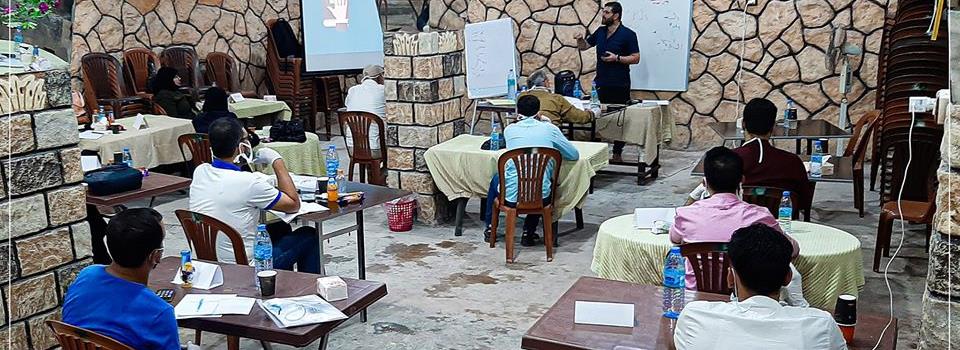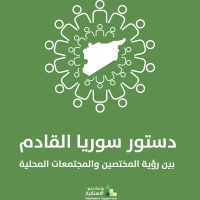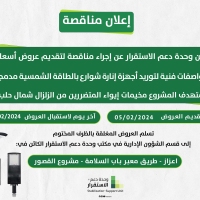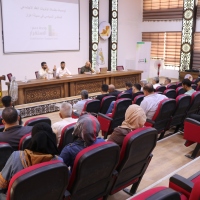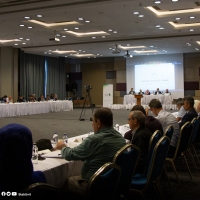Introduction:
Within the Stabilization Support Unit’s (SSU) efforts to raise the level of political awareness in northwestern Syria and as a continuation of the workshops that SSU has worked on regarding several general and political issues specifically the Constitutional Committee workshops that were held in the presence of members of the Constitutional Committee and the cochairman of the Constitutional Committee Mr. Hadi Al-Bahra, where in those workshops the weak awareness of the community members on the political issues/concepts were observed despite the fact that the attendees were from the educated groups, activists, and local bodies. This weakness is a result of the lack of political practices in the history of the Syrians. Therefore there is a need to work on political awareness programs that enable the local community to match the political situation the thing that necessarily leads to enhanced Political participation. So SSU has started to implement a bunch of political training workshops considering the importance of engaging the local community in the political processes and constitutional process.
Note that such trainings will be carried out in several areas inside Syria from the northeastern countryside of Aleppo to Idlib. We implemented the first training workshop in Marea Northern countryside of Aleppo.
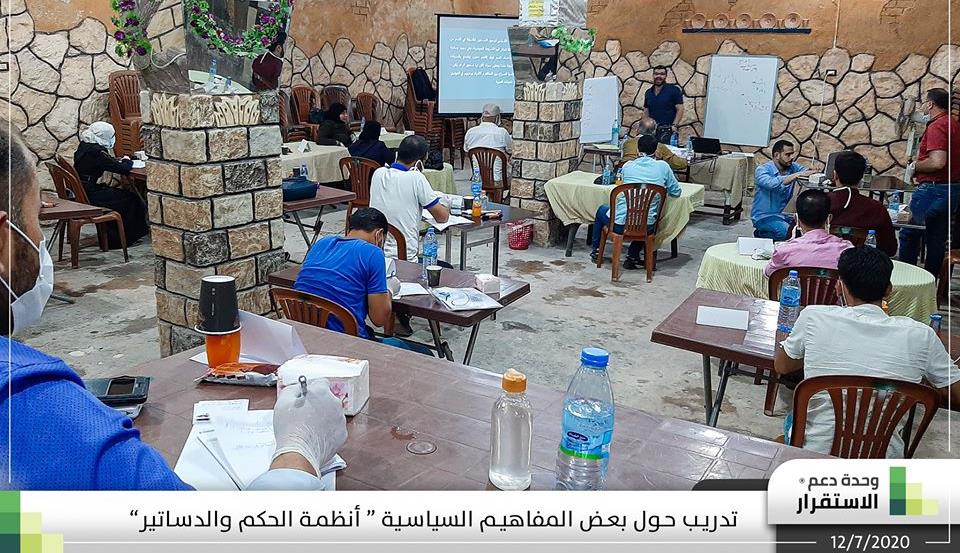
Attendees: A group of community leaders and activists (young men and women) from Tawafoq Initiative in Marea city
Date of training: 11 July 2020
Duration of the training: 2 days
The main topics of the training: Constitutions – Regimes of Governance
The progress of the training process
The First day:
An explanation made on the aim of the training which is to raise political awareness of the local community in the city of Marea by developing participants’ knowledge regarding some political principles and concepts such as constitutions and regimes of governance .
Topics discussed on the first day: the parliamentary system – the presidential system – the semi-presidential system.
In the beginning, we talked about the history of the parliamentary system – the Great Charter, or what is known as (Magna Carta), which established the parliamentary system in Britain, and that from there it moved to all parts of the world. After that, we talked about the features of the parliamentary system in terms of the way of election of parliament, the formation of the government, the selection,on the prime minister, and about the powers of this system. We also talked about the types of parliamentary systems giving examples from some countries that adopted the parliament system.
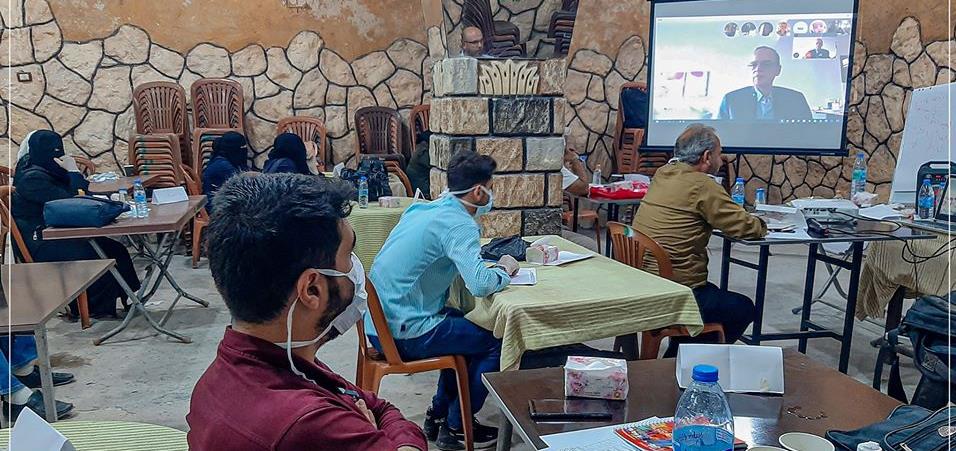
Then talks took place about the foundations of the parliamöantary system and the relationship between the legislative and executive powers, the partisan rigor that characterizes this system, and the functions of Parliament in the parliamentary system. Then the team showed a BBC video about the parliamentary system in Britain and the Magna Carta.
Then, we moved on to talk about the presidential system, its features, points of authority, and the relationship between the powers in the presidential system, the advantages and disadvantages of the presidential system and the aspects of cooperation between the powers, as the presidential system depends on the complete separation of powers.
Then we talked about the semi-presidential system that combines the presidential system and the parliamentary system, the emergence of the semi-presidential system, alongside talking about the main features of the semi-presidential system providing examples from countries adopted this system.
The second day:
The topics discussed in the second day was Definition of the constitution – the difference between the constitution and the organic/ordinary law – the emergence of constitutions – types of constitutions in terms of origin, codification, amendment, and status – procedures for amending the constitution – termination of constitutions – the content of constitutions – the history of constitutions in Syria since 1920 – 2012.
Initially, the importance of discussing the constitution was emphasized, as it is the first base considered by the international community regarding the political solution in Syria. The necessity for the Syrians to agree on a new constitution created an urgent need for holding such trainings to enhance the political participation of the Syrian local community and their assistance to the Constitutional Committee in developing a vision about the Syrians’ demands/requests from the constitution. The second day began with the definition of the constitution as a social contract or document that constitutes the supreme law of the country that regulate peoples’ lifes .
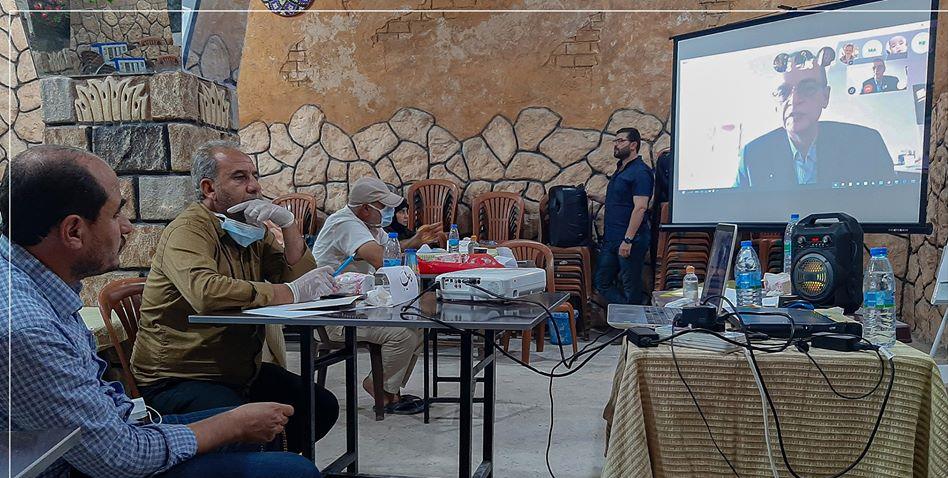
Then talk took place about the difference between the constitution and the organic/ordinary law, it was emphasized that the constitution is the peak of the legal pyramid and it determines the regime of the government in the country and determines the authorities of its three powers and all the lower laws arranged in the legislative pyramid adhere to it.
We talked about democratic and undemocratic methods in forming constitutions such as the grant method, the contracting method, the constituent assembly method, and the popular referendum method. After that, we talked about the types of constitutions (cumulative – codified and uncodified – customary – flexible and rigid – permanent and temporary).
We also talked about the procedures for amending the constitution; which includes initiating the amendment, studying the amendment proposal, and approving the amendment. Then we talked about the legal and illegal ways of terminating the constitutions.
After that, we moved on to talk about the content of constitutions, which are represented in the provisions that establish the legitimacy of the authority, provisions related to the nature of the state and the nature of the regime of government in it, provisions related to the powers and relations between them (complete separation of the powers – balance and cooperation between the powers – the focus of the powers) and provisions related to individual freedoms and rights.Finally, we talked about the history of constitutions in Syria, such as the 1920 constitution – the 1928 constitution – the 1950 constitution in the period of coups – the 1958 constitution in the period of unification between Syria and Egypt – and the 1961 constitution after the break of the union between Syria and Egypt- and finally the Baath party constitutions 1973 and 2012, where the most important contents/provisions of the mentioned constitutions were also discussed.

The final hour of the second day was specified to host Mr. Hadi Al-Bahra the cochairman of the constitutional committee, who had a discussion with participants and listened to their questions and inquires about the work mechanism of the Constitutional Committee, the decision-making mechanism in it, and the feasibility of the constitutional process and answered them.
Hadi Al-Bahra expressed his great gratitude from such trainings and from participating in them, he affirmed that such workshops would develop political awareness and thus enhance political participation and shape the future of Syria with the ideas of its sons.
Trainees’ recommendations regarding the constitution and the constitutional committee
Note that these recommendations were extracted from the opinions of the participants and the discussions that took place during the training and the questionnaires filled by the participants.
1- The constitution should include articles/provisions concerned with the education sector for its importance in the next stage, as well as articles/provisions concerned with the health sector.
2- The constitution should define the tasks of the army and security forces within specific restrictions to keep them away from civil life.
3- The constitution should emphasize equality between all different groups of the people to ensure freedom of opinion and expression regardless of religion or race.
4- The constitution should determine the President’s term with only one presidential term that could be extended only once .
5- The constitution should determine the mechanisms for forming the parliament, determine its functions and powers.
6- The constitution should emphasis compulsory education.
7- The constitution should include items that affirm the sanctity of public facilities and institutions.
8- The constitution should include items that enhance the role of women.
9- Seek to make the regime of government parliamentary.
10- The constitution should ensure the freedom of forming parties.
11- The constitution should include provisions to protect religious and ethnic minorities.
